Key takeaways:
- Mentorship goes beyond technical skills; it builds relationships grounded in trust and vulnerability, enabling personal and professional growth.
- Effective mentorship accelerates learning, encourages creative risk-taking, and expands networking opportunities within the filmmaking industry.
- Successful mentor-mentee relationships thrive on open communication, proactivity, and sharing personal experiences, fostering deeper connections and understanding.
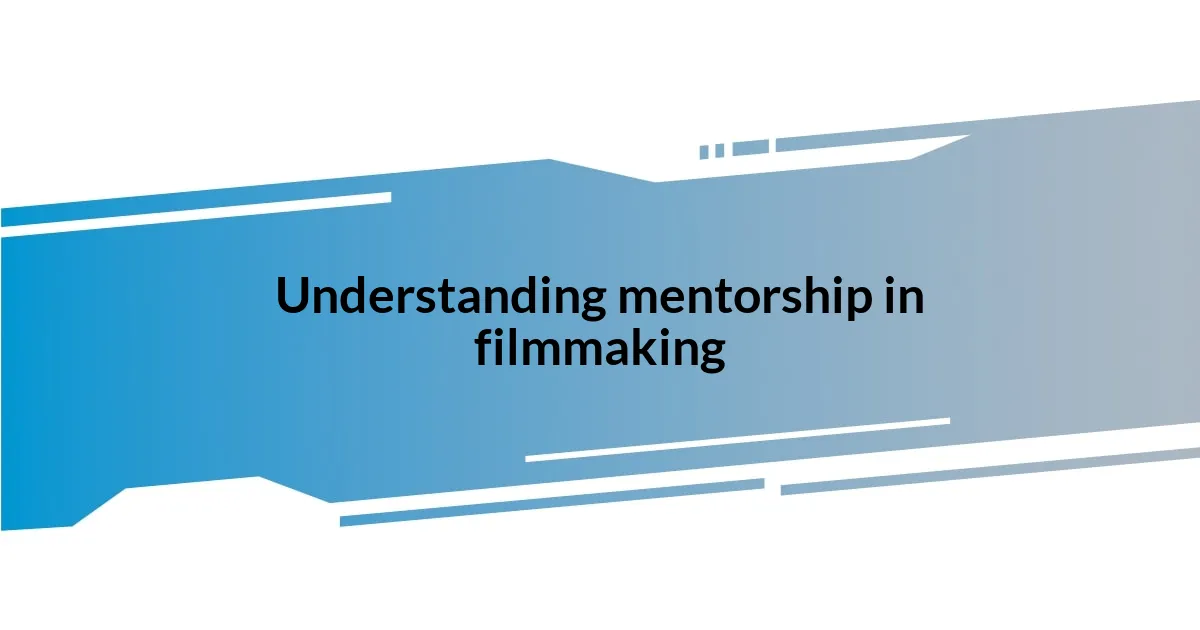
Understanding mentorship in filmmaking
Mentorship in filmmaking is not just about imparting technical knowledge; it’s about building relationships that foster growth. I clearly remember my first experience on set with a mentor who guided me not only through the practical aspects of camera work but also through the emotional nuances of storytelling. It makes you wonder: how would I have approached those challenges without that supportive figure beside me?
It’s fascinating how mentorship can vary from one individual to another, adapting to the unique needs of each filmmaker. I’ve encountered mentors who challenged my creative choices while others simply opened doors for me. This diversity in mentorship shapes the way we learn—don’t you think having different styles and approaches only enriches our journey in the industry?
When I reflect on mentorship, I realize it is steeped in trust and vulnerability. For instance, a mentor once shared their own failures with me, expressing how those setbacks ultimately led to their success. It really drove home the point that mentorship is a two-way street—what can we learn from each other’s journeys, and how can we bridge the gap between theory and practice in filmmaking together?
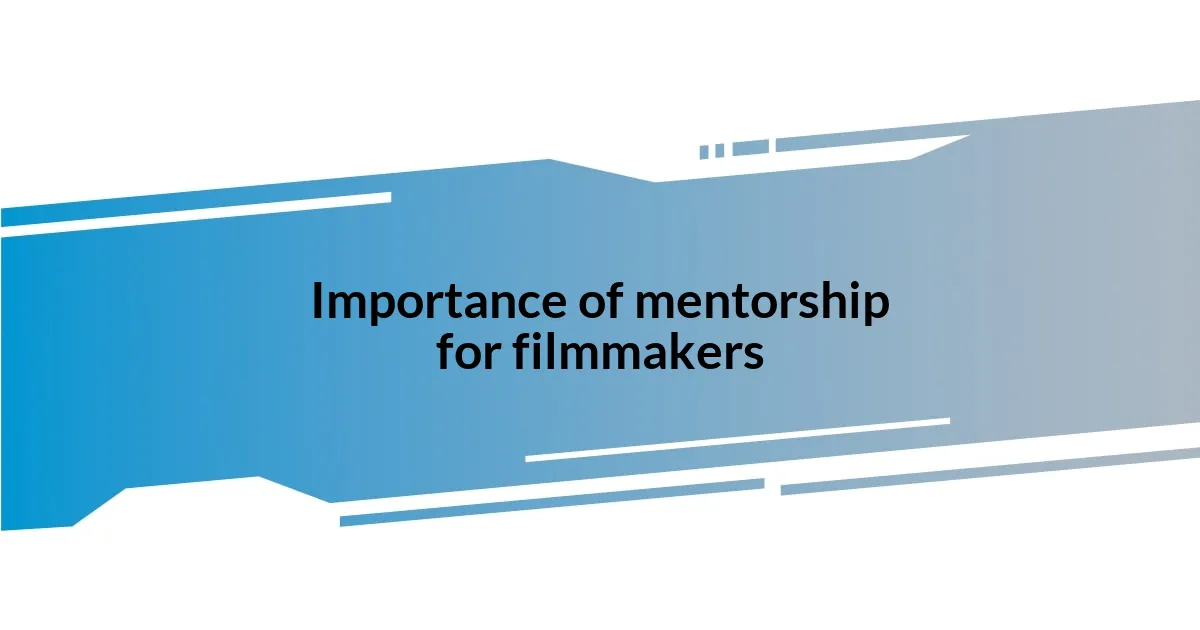
Importance of mentorship for filmmakers
The importance of mentorship for filmmakers cannot be overstated. Having a mentor can drastically shorten the learning curve; I still remember how quickly I improved when I worked alongside an experienced director. Their feedback was invaluable, transforming my raw ideas into polished concepts. It’s interesting to consider how much time and energy a mentor can help you save—don’t you think that’s an investment worth making?
Mentorship also creates a safe space to experiment and take risks. I once had a mentor who encouraged me to pursue a bold, unconventional narrative for a short film project. Their belief in me pushed me to explore uncharted territory and discover my voice as a storyteller. It’s clear that having someone who believes in your potential can ignite a spark that leads to significant growth. Have you ever had someone champion your creative vision?
Additionally, mentorship fosters a network of connections that can elevate a filmmaker’s career. I was fortunate enough to be introduced to other industry professionals through my mentor, which opened doors to opportunities I never would have encountered on my own. This ripple effect demonstrates how mentorship is not just about direct guidance; it also amplifies your presence in the industry. Isn’t it remarkable how one relationship can lead to a web of new possibilities?
| Aspect | Value of Mentorship |
|---|---|
| Learning Curve | Accelerates growth and skill development |
| Creative Risk-Taking | Encourages experimentation and personal voice |
| Networking Opportunities | Expands professional connections |

Types of mentorship relationships
Mentorship relationships in filmmaking can take on various forms, each with its own nuances and benefits. From my own experience, I have navigated different mentorship styles that profoundly influenced my creative journey. Some mentors adopt a hands-on approach, guiding you through specific projects; others might play more of a distant advisory role, offering wisdom when you encounter pivotal moments. I remember working with a mentor who was hands-on, diving into the script with me. Their drive to collaborate not only taught me technical skills but also built my confidence to voice my ideas.
Here’s a closer look at the types of mentorship relationships you might encounter:
- One-on-One Mentorship: A direct, personal connection where specific skills and insights are tailored to the mentee’s needs.
- Peer Mentorship: Involves colleagues at similar experience levels offering support and feedback, fostering a mutual growth environment.
- Group Mentorship: A mentor guides a larger group, sharing insights and encouraging collaboration among peers, often leading to diverse perspectives.
- Reverse Mentorship: Younger filmmakers mentor more experienced professionals, bringing fresh ideas and new technologies into the discussion. I had the opportunity to learn from a talented newcomer who introduced me to modern editing techniques, which revitalized my approach.
Each of these relationships brings something unique to the table. The emotional connection and the wisdom shared can be transformative, turning the daunting world of filmmaking into a more accessible and exciting journey.
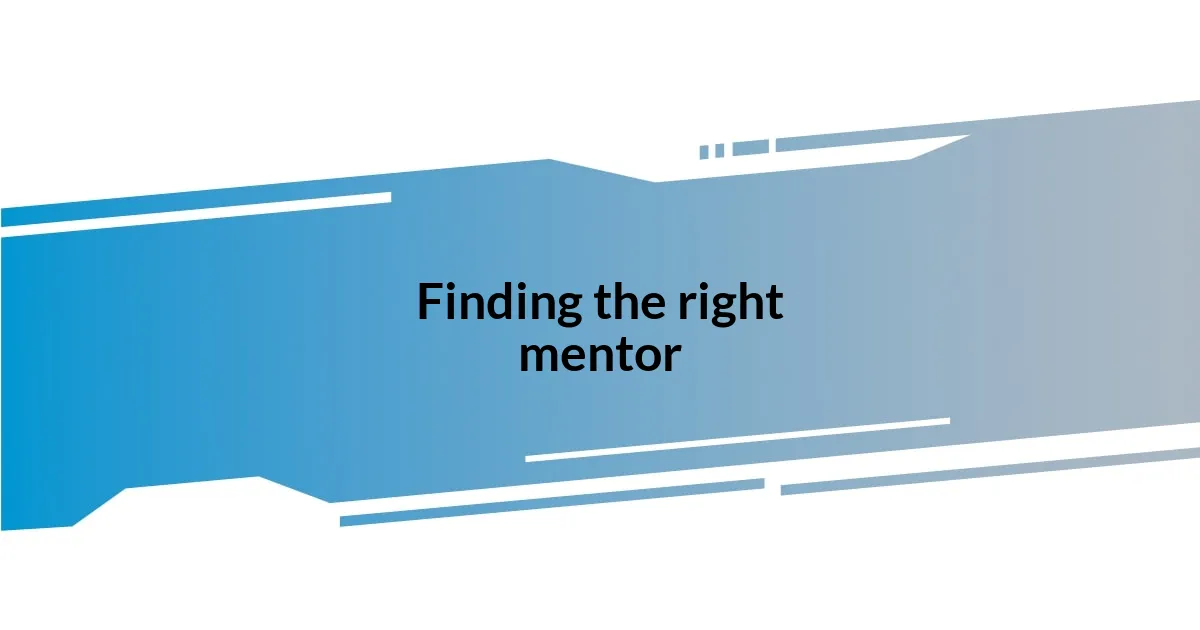
Finding the right mentor
When I think about finding the right mentor, the first thing that comes to mind is the importance of alignment in goals and values. I remember seeking out someone whose artistic vision resonated with mine, and it made all the difference. Have you ever worked with someone whose perspective just clicked with yours? That kind of synergy can create a profoundly enriching mentorship experience because it fosters genuine understanding and growth.
Another aspect to consider is the level of accessibility and approachability of a potential mentor. I sought mentors who were not only seasoned professionals but also genuinely open to dialogue. There was one director I reached out to who, despite their busy schedule, always made time for a quick chat. Their willingness to share their experiences and insights made me feel valued and supported. That kind of encouragement is pivotal, don’t you think?
Lastly, don’t underestimate the power of a mentor who challenges you. A mentor should not just echo your ideas but also push you beyond your comfort zone. I encountered a mentor who consistently questioned my choices in storytelling, which initially felt uncomfortable but ultimately led me to refine my voice and sharpen my skills. I still find myself grateful for that push—how often do we really grow without a little nudge? Finding a mentor who believes in your potential while also challenging you is a rare gem worth searching for.
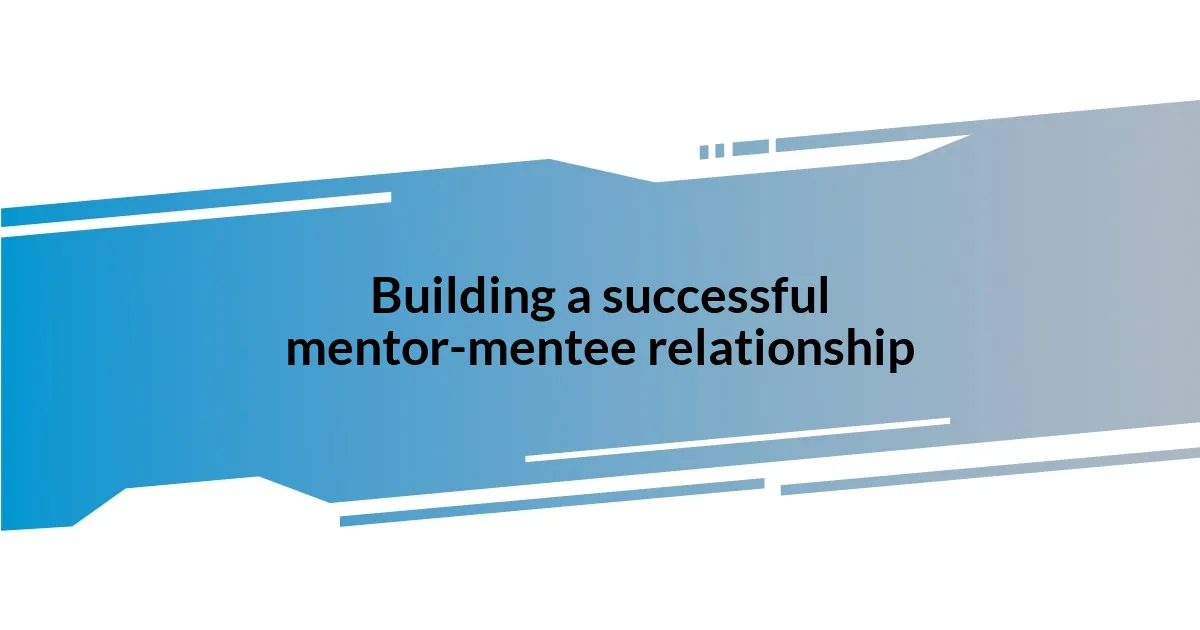
Building a successful mentor-mentee relationship
Establishing a successful mentor-mentee relationship requires open communication from the start. I vividly recall my first meeting with a mentor where we spent half the session discussing our expectations and boundaries. It felt refreshing to have that clarity—it made me realize how essential trust is for exchanging honest feedback. Have you ever felt hesitant to voice your thoughts? That initial conversation alleviated any nerves I had and fostered a safe space for exploration.
Another vital aspect is being proactive in the relationship. I remember taking the initiative to send my mentor updates on my projects, which opened the door to deeper conversations about my work. This not only demonstrated my commitment but also showcased the progress I was making. It’s intriguing how a little effort can ignite a more dynamic exchange, isn’t it? Regular check-ins and updates can turn a one-sided relationship into a collaborative partnership.
Lastly, I’ve found that sharing personal stories can strengthen the bond. When my mentor opened up about their early career struggles, I felt an instant connection. It made me realize that they had faced similar challenges, and it was comforting to know I wasn’t alone in my journey. Those moments of vulnerability can create a deeper understanding and inspire mutual growth. Wouldn’t it be great if every mentorship relationship thrived on that kind of shared humanity?
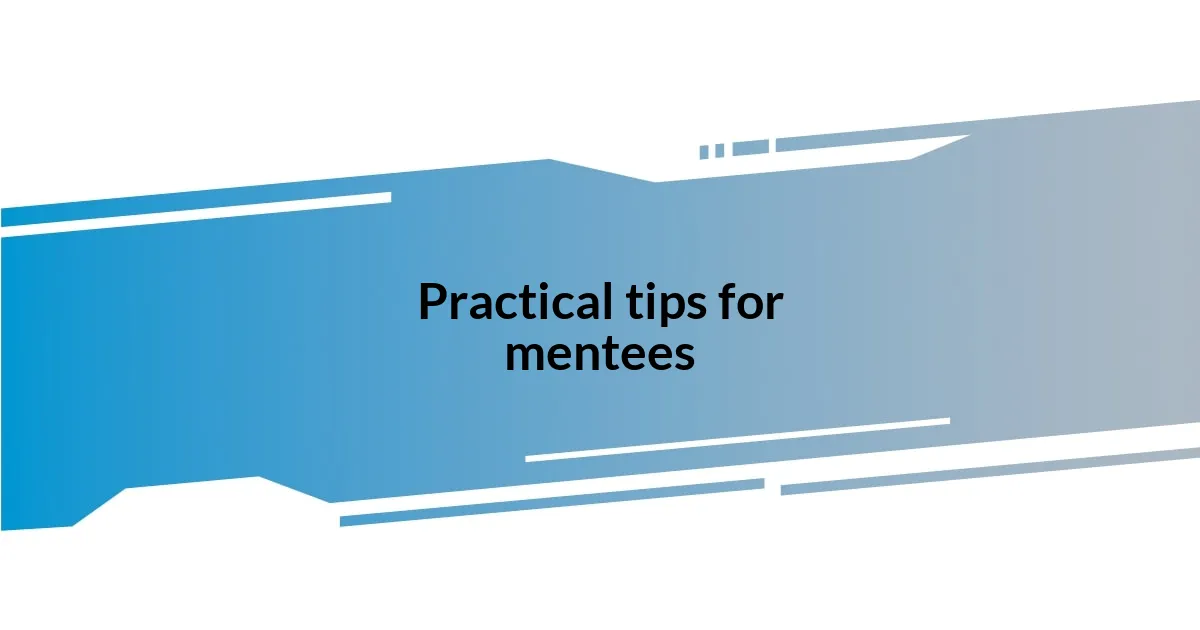
Practical tips for mentees
Being a mentee is more than just soaking in knowledge; it’s about actively engaging in the relationship. I made it a point to ask my mentor questions that not only pertained to our discussions but also sparked deeper conversations. Once, I asked them about the biggest mistake they made in their career, and the story they shared was a game-changer for me. It’s fascinating how a single question can open up new pathways for understanding, don’t you think?
Don’t shy away from seeking feedback—it’s a golden opportunity for growth. Early on, I submitted a rough cut of a short film to my mentor, anxious about their response. When they meticulously pointed out areas for improvement, I felt a mix of vulnerability and excitement. Those constructive critiques propelled me to refine my craft and ultimately made my project shine. How else would I have discovered those blind spots without their perspective?
Lastly, be patient and flexible with your expectations. I once went in with a rigid idea of what I wanted to gain from my mentorship, and it stifled my learning experience. As time went on, I realized that embracing spontaneity led to the most valuable lessons. A casual lunch where my mentor shared their creative process ended up being one of the most insightful moments of our time together. It’s amazing how sometimes the best lessons arise organically, wouldn’t you agree?
